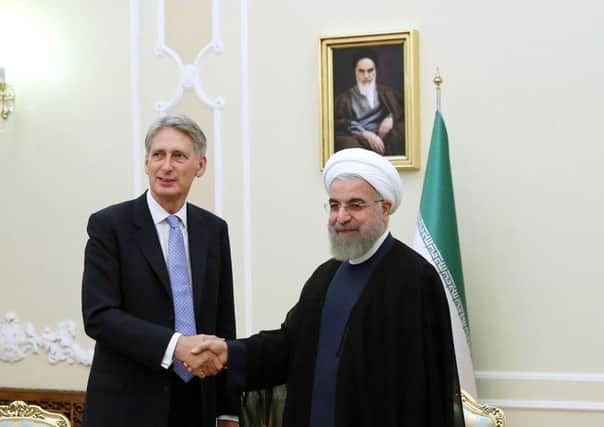Hammond pledges to caution on Iran deal


Speaking from Tehran where the UK has reopened its embassy, Mr Hammond said Iran was “too large a player” in the Middle East to leave in isolation, but insisted he was not blind to the risks the country can pose to regional stability.
Britain closed its embassy in Tehran in 2011 after a mob rampaged through the compound, smashing windows, torching cars and burning Union flags. The embassy has now reopened following a historic international deal on Iran’s nuclear programme.
Advertisement
Hide AdAdvertisement
Hide AdBut the Foreign Secretary said that despite a “deep legacy of distrust”, the UK and Iran share common ground on the need to defeat IS, also known as Isil, in Syria and Iraq, as well as stopping opium reaching Europe from Afghanistan.
Once the two countries start working together on these issues it will be easier to address areas of disagreement, such as on human rights in Iran, he said.
Mr Hammond told BBC Radio 4’s Today programme: “We should tread carefully, there’s a deep legacy of distrust on both sides and we have major areas where have very substantial policy differences.
“So we should tread cautiously, but that doesn’t mean we shouldn’t be talking, that we shouldn’t attempt dialogue, that we shouldn’t discuss areas where we do see eye-to-eye.
Advertisement
Hide AdAdvertisement
Hide Ad“We do see eye-to-eye on the need to interdict the opium traffic between Afghanistan and Europe, we do see eye-to-eye on the need to challenge Isil, for example, and there are areas where we can work together.
“And as we work more closely together in those areas we will find it easier to have a sensible dialogue about the many areas on which we disagree, including human rights in Iran.”
Mr Hammond said he was not “blind to the faults” with Iran, but insisted it was crucial to work with the major regional power.
Mr Hammond is the first British foreign secretary to visit Tehran since 2003 and only the third UK minister to visit since the 1979 revolution.